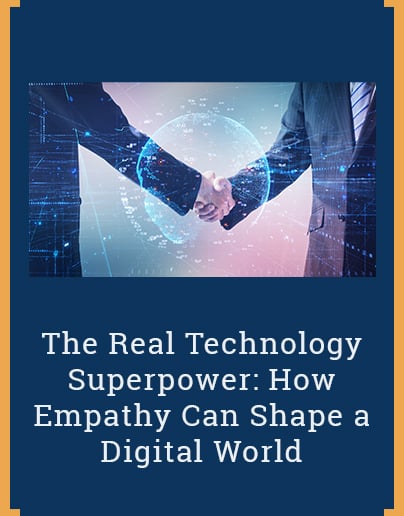The Real Technology Superpower: How Empathy Can Shape a Digital World
We often hear the terms “user experience” or “customer experience” when it comes to tech solutions. I prefer a more personal approach. Whenever I begin work on a new project, I have a four-part framework I use to help orient the design team. It’s what I need to know right off the bat and it’s always the same.
Intevity’s Service Framework
- Who am I serving?
- What are the needs that I am meeting in that serving and how am I going to do that? In other words, how do I help?
- What are the experiences I need to create to meet those needs?
- Where is the person I’m serving at? This moves away from thinking that people are going to come to us. We need to meet people where they’re at and help bring them to where we want them to go.
All these things have one thing in common: empathy. Let me explain why I think that matters.

Check Your Bias
Empathy starts with understanding where people are coming from. Number 4 is important because this idea of, “If you build it, they will come,” only works in the movies. There’s an inherent bias in that approach. Are we looking at it through the lens of our own personal experience or perspective? When someone says, “We think we’re serving this person,” I’ll ask, “Are we really?“
When we step in to build a solution, the more we learn how to serve our clients (and their customers), the more trust and loyalty we generate. No one wants to be cared for less. No one wants to be served less. Most of the time, people are under served and under cared for. This is where empathy comes in – thinking deeply about who it is we are serving with our work. And it is at the core of Intevity’s business relationship framework.
Five years ago, I wrote a blog about leadership and the importance of empathy in business: “Through greater empathy, we develop a unique lens into the world around us, one that is more compassionate and more insightful.“[1]
It’s Personal
I still believe this. I work on building my empathy muscle every day, to bring it into all aspects of my life: personal relationships, community service, how I run my business, and building tech solutions with my team – solutions designed for people.[2]
In simplest terms, “empathy is the capacity to understand or feel what another person is experiencing from within their frame of reference, that is, the capacity to place oneself in another’s position.“

They say humility isn’t thinking less of yourself, it’s just thinking of yourself less. To me, that’s the way to lean into serving people. It’s not because I lack confidence in my ability. I know I’m good at what I do, but that doesn’t matter. What matters is how I come alongside you and help you with something you need to accomplish, whether at a personal level or in business.
“Establishing empathy as a cultural pillar encourages employees to view the business and their work from an outside-in perspective, infusing it with insights and ideas drawn from the needs and goals of customers, partners and even competitors. It also enables employees to build technology that’s more personal, predictive and tailored to customers’ unique needs.“[3]
It’s a Partnership
I like this idea of coming alongside somebody, trying to discover their biggest challenge. When I’m in the room with an executive, I imagine what it’s like being on their side of the table. That’s what empathy is – sitting next to somebody, looking at that same problem and being there for them. I’m not trying to sell to them. I never approach it through the lens of what I get from them, but simply what they need done.

I know I’m on the right track when the conversation goes like this: “Ben, technology is confusing. We don’t have the expertise, and it’s constantly tripping us up. I need someone that’s looking at this problem from my perspective. I know you’re here to help us figure it out.“
Empathy in a Digital World
The challenge with technology is that, even though it scales well, it’s sterile. It doesn’t lead you towards knowing a person unless you make it warm. We do that by remembering there are real interactions we’re trying to enhance, or a real person trying to engage with an organization, and that we’re trying to make that connection feel deeply personal.
Building digital solutions is more fun when you remember they impact a person’s life. This informs my philosophy of how I build things. I always want to know their story.
Let’s Talk About It
At a relational level, technology creates distance, and disconnection. Just look at social media and the way it’s been built without recognizing there’s a human at the other end. It creates this paradigm where, “I can talk with you, but I don’t really know you.“
It’s like I tell my kids, “If you have a conflict with somebody, go talk to them.” Conflict feels a lot different in person than conflict done over the internet. Online and on social media, you’re getting that disconnection because text is a sterile medium. You don’t feel the weight of your actions in the same way as you do up close and personal with someone that’s really struggling.
Empathy is a Superpower
As you can see, I have a lot to say about this topic. I wouldn’t say we need empathy more than when I wrote that article five years ago. The reality is it has always been needed. When it comes to digital, there’s a lot of room for empathy. It can even be a competitive advantage. The number of people who are willing to come alongside and help somebody is much smaller than the group that wants to just tell people things.
Let’s use this superpower and build amazing things to serve people, to help people, to meet them where they’re at. The point is not building great user experiences that we think customers need. It’s knowing who it is we are serving and making it personal. It’s a big ask – and I love that.
[1] https://www.linkedin.com/pulse/leadership-empathy-muscle-benjamin-elmore/
[2] https://en.wikipedia.org/wiki/Empathy
[3] https://www.forbes.com/sites/forbesbusinesscouncil/2021/07/28/is-there-roi-in-empathy/?sh=e501535ca3f7

